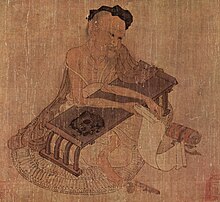Fu Sheng (scholar)
| Fu Sheng | |
|---|---|

|
|
| Born | 3rd century BC Zouping or Zhangqiu |
| Died | 2nd century BC |
| Academic background | |
| School or tradition | Confucianism |
| Academic work | |
| Main interests | Shangshu |
| Notable works |
Shangshu (new text) Shangshu Dazhuan |
Fu Sheng (Chinese: 伏胜; 268–178 BC), also known as Master Fu (伏生), was a Confucian scholar of the Qin and Western Han dynasties of ancient China. He was famous for saving the Confucian classic Shangshu (Book of Documents) from the book burning of the First Emperor of Qin.
Fu Sheng was a native of Jinan prefecture (濟南, in present-day Zouping or Zhangqiu, Shandong province), and was said to be a descendant of the legendary ancient ruler Fu Xi. He was a boshi (博士, "erudite") of the Qin dynasty. In 213 BC the First Emperor of Qin ordered the Burning of Books and killed many Confucian scholars. Risking his life, Fu Sheng hid a copy of the book in the walls of his house. He later escaped his hometown in the warfare that soon broke out and eventually ended the Qin dynasty. After the Han dynasty was established in 206 BC, Fu Sheng returned home and retrieved the scrolls. However, he was only able to recover 29 chapters; the rest (tens of chapters) had been lost to damage or decay. (Some scholars believe that Fu Sheng memorized the chapters instead of recovering them from the walls.)
According to Sima Qian's Records of the Grand Historian, when Emperor Wen of Han (r. 180–157 BC) searched the country for copies of the Shangshu, Fu Sheng was the only person who could produce one. As Fu was already over 90 years old and unable to travel, Emperor Wen dispatched the official Chao Cuo to study the Shangshu from him. Fu's daughter or granddaughter had to interpret the old man's words for the official. "The daughter’s role was crucial because Fu Sheng spoke only the dialect of the ancient state of Qi, an idiom incomprehensible to the official charged with transcribing the text." Fu's other disciples, surnamed Ouyang and Zhang, also became masters of Shangshu. Master Ouyang's great-grandson Ouyang Gao (歐陽高) would later found one of the three main schools for the study of Shangshu.Kong Anguo, the scholar who later compiled the "old text" Shangshu, also studied with him.
...
Wikipedia
